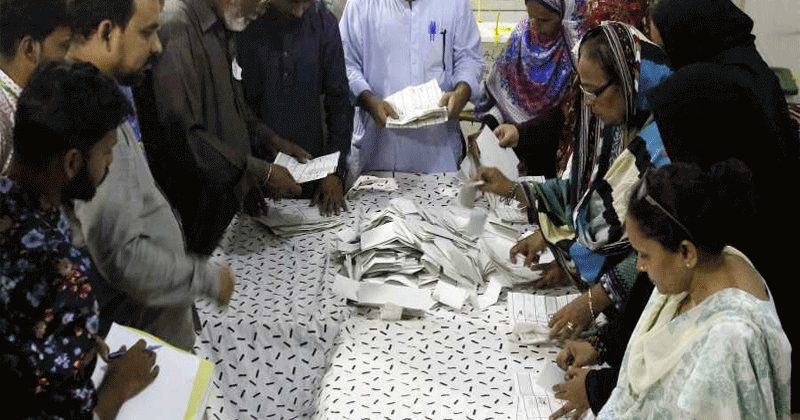
Pakistan had completed its elections yesterday despite many speculations and bombings. But who leads the results?
Pakistan’s flamboyant cricketer-turned-politician Imran Khan’s Pakistan Tehreek-e-Insaf (PTI) was leading in 99 parliamentary seats while its main rival Pakistan Muslim League-Nawaz (PML-N) was ahead on 54 seats in the initial round of counting on Wednesday in an election marred by a deadly suicide attack and allegations of manipulations by the powerful military.
The Pakistan Peoples Party (PPP) of former president Asif Ali Zardari was leading in 32 seats, a sign indicating that he could play a “kingmaker” in case of a hung parliament, according to media reports.
Independents were ahead on 20 seats according to trends available for 230 seats out of 272 seats.
READ ALSO: Pakistan Election 2018: Imran Khan’s Party move Close to Majority Mark: See Latest Results
The Muttahida Majlis-e-Amal (MMA) — an alliance of traditional religious parties such as Jamaat-e-Islami led by Qazi Hussain Ahmed, Jamiat Ulema-e-Islam-Fazl headed by Maulana Fazlur Rehman, Jamiat Ulema-e-Pakistan led by Maulana Shah Ahmad Noorani and Tehreek-e-Jafaria led by Allama Sajid Naqvi — was leading in 11 national assembly seats.
Pakistan’s National Assembly comprises a total of 342 members, of which 272 are directly elected whereas the rest — 60 seats reserved for women and 10 for religious minorities — are selected later through proportional representation among parties with more than 5% of the vote.
A party can only form the government if it manages to clinch 172 seats in total. PML-N chief Shahbaz Sharif, who is hoping to become the next prime minister, was leading with 4,230 votes in NA-249 (Karachi West-II), according to trends.
PPP chairman Bilawal Bhutto Zardari was leading with 5,218 votes in NA-200 (Larkana I).
According to the Election Commission, 3,459 candidates are in the race for 272 general seats of the National Assembly, while 8,396 candidates are running for 577 general seats of the four provincial assemblies — Punjab, Sindh, Balochistan and Khyber-Pakhtunkhwa. More than 30 political parties have fielded their candidates for the elections. In Punjab Assembly, PML-N and PTI were in a neck-and-neck fight with both leading on 54 and 43 seats respectively according to trends available for 119 seats out of 297 seats.
In Sindh Assembly, PPP was emerging as the single largest party in its traditional bastion.
The party was leading on 31 seats according to trends available for 45 seats out of 131 seats.
READ ALSO: Pakistan with ‘Al-Badr’, a massive security threat for India
PTI was leading on five seats while PML-N was ahead on one. In Khyber-Pakhtunkhwa, PTI was leading on seven of 99 Assembly seats.
Earlier, an Islamic State suicide bomber blew himself up outside a polling station killing 34 people in Pakistan’s southwestern Quetta city on Wednesday and four others were murdered in poll-related violence as the country went to polls.
The suicide bomber blew himself up after he was stopped from entering the Tameer-i-Nau Education Complex school, which is serving as a polling station in “sensitive” NA-260 constituency in Quetta, the capital of Balochistan, police said.
The run up to the elections has seen a massive crackdown on the media and allegations that the military has secretly backed the campaign of Imran Khan while targeting his political opponents.

Post Your Comments